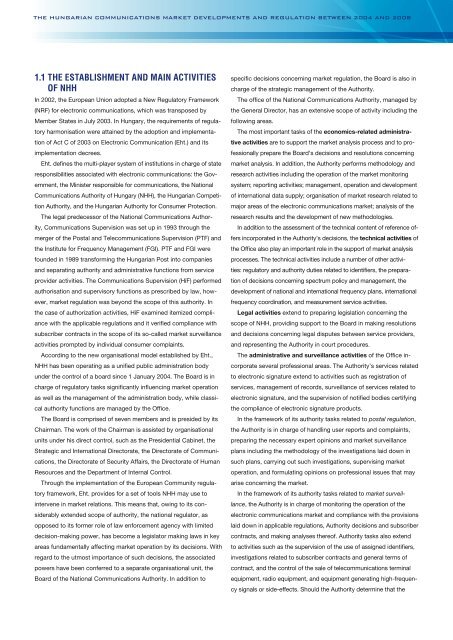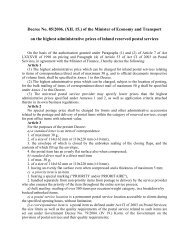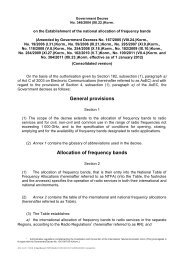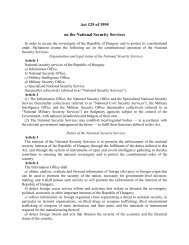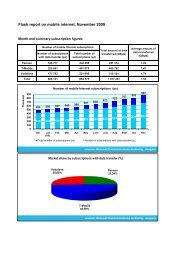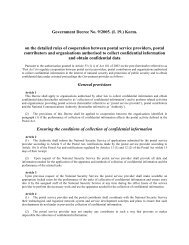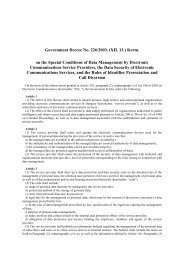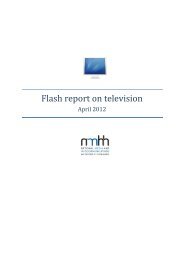The Hungarian Communications Market Developments and ...
The Hungarian Communications Market Developments and ...
The Hungarian Communications Market Developments and ...
You also want an ePaper? Increase the reach of your titles
YUMPU automatically turns print PDFs into web optimized ePapers that Google loves.
<strong>The</strong> <strong>Hungarian</strong> <strong>Communications</strong> <strong>Market</strong> <strong>Developments</strong> <strong>and</strong> Regulation between 2004 <strong>and</strong> 2008<br />
1.1 <strong>The</strong> establishment <strong>and</strong> main activities<br />
of NHH<br />
In 2002, the European Union adopted a New Regulatory Framework<br />
(NRF) for electronic communications, which was transposed by<br />
Member States in July 2003. In Hungary, the requirements of regulatory<br />
harmonisation were attained by the adoption <strong>and</strong> implementation<br />
of Act C of 2003 on Electronic Communication (Eht.) <strong>and</strong> its<br />
implementation decrees.<br />
Eht. defines the multi-player system of institutions in charge of state<br />
responsibilities associated with electronic communications: the Government,<br />
the Minister responsible for communications, the National<br />
<strong>Communications</strong> Authority of Hungary (NHH), the <strong>Hungarian</strong> Competition<br />
Authority, <strong>and</strong> the <strong>Hungarian</strong> Authority for Consumer Protection.<br />
<strong>The</strong> legal predecessor of the National <strong>Communications</strong> Authority,<br />
<strong>Communications</strong> Supervision was set up in 1993 through the<br />
merger of the Postal <strong>and</strong> Telecommunications Supervision (PTF) <strong>and</strong><br />
the Institute for Frequency Management (FGI). PTF <strong>and</strong> FGI were<br />
founded in 1989 transforming the <strong>Hungarian</strong> Post into companies<br />
<strong>and</strong> separating authority <strong>and</strong> administrative functions from service<br />
provider activities. <strong>The</strong> <strong>Communications</strong> Supervision (HíF) performed<br />
authorisation <strong>and</strong> supervisory functions as prescribed by law, however,<br />
market regulation was beyond the scope of this authority. In<br />
the case of authorization activities, HíF examined itemized compliance<br />
with the applicable regulations <strong>and</strong> it verified compliance with<br />
subscriber contracts in the scope of its so-called market surveillance<br />
activities prompted by individual consumer complaints.<br />
According to the new organisational model established by Eht.,<br />
NHH has been operating as a unified public administration body<br />
under the control of a board since 1 January 2004. <strong>The</strong> Board is in<br />
charge of regulatory tasks significantly influencing market operation<br />
as well as the management of the administration body, while classical<br />
authority functions are managed by the Office.<br />
<strong>The</strong> Board is comprised of seven members <strong>and</strong> is presided by its<br />
Chairman. <strong>The</strong> work of the Chairman is assisted by organisational<br />
units under his direct control, such as the Presidential Cabinet, the<br />
Strategic <strong>and</strong> International Directorate, the Directorate of <strong>Communications</strong>,<br />
the Directorate of Security Affairs, the Directorate of Human<br />
Resources <strong>and</strong> the Department of Internal Control.<br />
Through the implementation of the European Community regulatory<br />
framework, Eht. provides for a set of tools NHH may use to<br />
intervene in market relations. This means that, owing to its considerably<br />
extended scope of authority, the national regulator, as<br />
opposed to its former role of law enforcement agency with limited<br />
decision-making power, has become a legislator making laws in key<br />
areas fundamentally affecting market operation by its decisions. With<br />
regard to the utmost importance of such decisions, the associated<br />
powers have been conferred to a separate organisational unit, the<br />
Board of the National <strong>Communications</strong> Authority. In addition to<br />
specific decisions concerning market regulation, the Board is also in<br />
charge of the strategic management of the Authority.<br />
<strong>The</strong> office of the National <strong>Communications</strong> Authority, managed by<br />
the General Director, has an extensive scope of activity including the<br />
following areas.<br />
<strong>The</strong> most important tasks of the economics-related administrative<br />
activities are to support the market analysis process <strong>and</strong> to professionally<br />
prepare the Board’s decisions <strong>and</strong> resolutions concerning<br />
market analysis. In addition, the Authority performs methodology <strong>and</strong><br />
research activities including the operation of the market monitoring<br />
system; reporting activities; management, operation <strong>and</strong> development<br />
of international data supply; organisation of market research related to<br />
major areas of the electronic communications market; analysis of the<br />
research results <strong>and</strong> the development of new methodologies.<br />
In addition to the assessment of the technical content of reference offers<br />
incorporated in the Authority’s decisions, the technical activities of<br />
the Office also play an important role in the support of market analysis<br />
processes. <strong>The</strong> technical activities include a number of other activities:<br />
regulatory <strong>and</strong> authority duties related to identifiers, the preparation<br />
of decisions concerning spectrum policy <strong>and</strong> management, the<br />
development of national <strong>and</strong> international frequency plans, international<br />
frequency coordination, <strong>and</strong> measurement service activities.<br />
Legal activities extend to preparing legislation concerning the<br />
scope of NHH, providing support to the Board in making resolutions<br />
<strong>and</strong> decisions concerning legal disputes between service providers,<br />
<strong>and</strong> representing the Authority in court procedures.<br />
<strong>The</strong> administrative <strong>and</strong> surveillance activities of the Office incorporate<br />
several professional areas. <strong>The</strong> Authority’s services related<br />
to electronic signature extend to activities such as registration of<br />
services, management of records, surveillance of services related to<br />
electronic signature, <strong>and</strong> the supervision of notified bodies certifying<br />
the compliance of electronic signature products.<br />
In the framework of its authority tasks related to postal regulation,<br />
the Authority is in charge of h<strong>and</strong>ling user reports <strong>and</strong> complaints,<br />
preparing the necessary expert opinions <strong>and</strong> market surveillance<br />
plans including the methodology of the investigations laid down in<br />
such plans, carrying out such investigations, supervising market<br />
operation, <strong>and</strong> formulating opinions on professional issues that may<br />
arise concerning the market.<br />
In the framework of its authority tasks related to market surveillance,<br />
the Authority is in charge of monitoring the operation of the<br />
electronic communications market <strong>and</strong> compliance with the provisions<br />
laid down in applicable regulations, Authority decisions <strong>and</strong> subscriber<br />
contracts, <strong>and</strong> making analyses thereof. Authority tasks also extend<br />
to activities such as the supervision of the use of assigned identifiers,<br />
investigations related to subscriber contracts <strong>and</strong> general terms of<br />
contract, <strong>and</strong> the control of the sale of telecommunications terminal<br />
equipment, radio equipment, <strong>and</strong> equipment generating high-frequency<br />
signals or side-effects. Should the Authority determine that the


